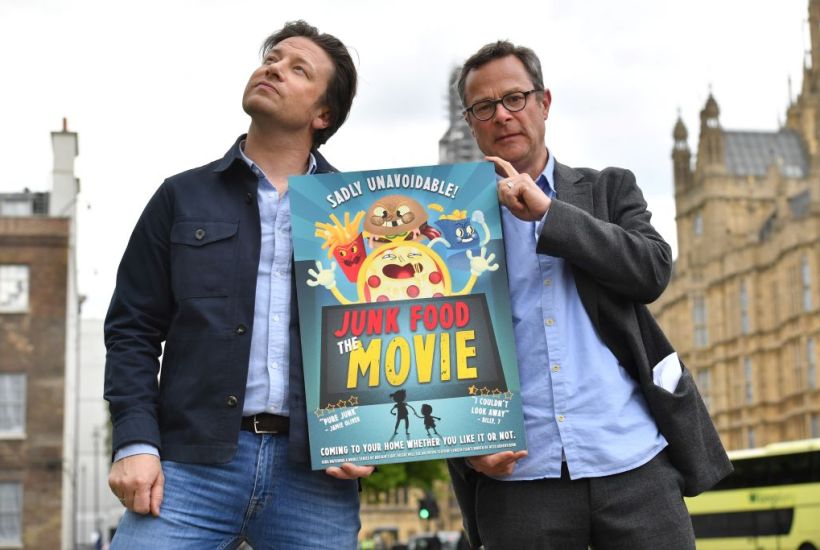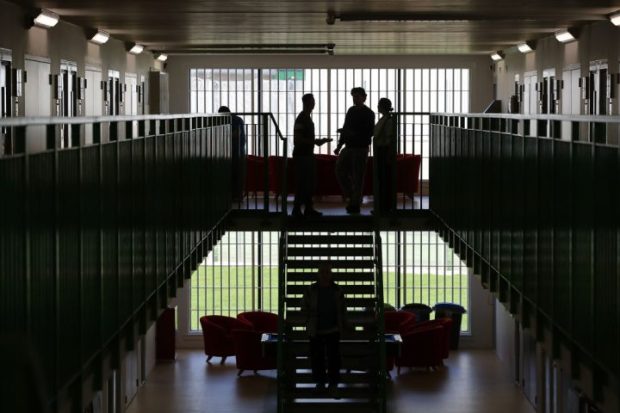With his little round spectacles and earnest expression, Hugh Fearnley-Whittingstall is the Penfold to Jamie Oliver’s Dangermouse. Both men have been largely forced out of the restaurant business due to public indifference and now spend their time writing endless cook books and lobbying the government for tougher laws on food that is deemed high in salt, sugar and fat.
This is a dangerous game for chefs to play since they use a great deal of salt, sugar and fat at work, but Oliver’s been getting away with it for the last twenty years and neither he nor Fearnley-Whittingstall do much cheffing these days in any case. Jamie’s restaurant empire has been reduced to a few pizza and burger joints in Gatwick Airport and Fearnley-Whittingstall has closed his restaurants in Plymouth and Winchester, leaving him with just the River Cottage Canteen in Axminister.
As neither man has much food to advertise, they won’t be much affected by a government proposal – which they lobbied for – to ban all online advertising for HFSS food (high in fat, sugar or salt). They call this ‘junk food’, but you probably wouldn’t. It includes a vast range of everyday food products such as you would find in your local bakery or farmer’s market as well as the kind of treats that Jamie Oliver used to happily advertise for Sainsbury’s.
Fearnley-Whittingstall wants adverts for these products banned before 9pm on television and banned altogether online. Boris Johnson, in his post-Covid panic, initially expressed interest in this idea, but the government has since looked at the detail and decided that banning wedding cakes advertisements on Facebook might be a bit excessive. Penfold sees victory slipping from his fingers and he has hit back. In an interview with the Telegraph to promote his 28th book, he lamented that ‘we don’t police people’s diets’ and came up with a terrible argument for why ‘we’ (i.e. the government) should start doing so.
‘The pandemic is a very interesting potential catalyst for further and more rapid change’, he said. ‘We’re in the middle of the biggest health intervention, not just in the UK but globally. Lockdown is the government telling us how to behave for our health. If you give people that level of restriction and tell them how to behave, you can surely give them a bit more help with their diet.’
This is what the economist Friedrich Hayek called the road to serfdom. Fearnley-Whittingstall sees authoritarian measures carried out during a crisis and spots an opportunity. Where others see a temporary expansion of state power as the lesser of two evils during a pandemic, Fearnley-Whittingstall sees ‘potential’. He sees a permanent shift in the relationship between the state and the individual.
As I wrote during the first lockdown, there is always a danger that prolonged exposure to draconian regulations will normalise illiberalism. Here we see its manifestation. Fearnley-Whittingstall is arguing that taxes and bans designed to change what people eat – which he euphemistically calls ‘a bit more help’ – are less coercive than lockdowns. That is obviously true, but what isn’t less coercive than a lockdown? Lockdowns are the least liberal policy in modern history. It is a very low bar.
Fearnley-Whittingstall says that lockdowns are ‘the government telling us how to behave for our health’, but that is not true. They are the government telling us how to behave for other people’s health. If COVID-19 only affected the individual, there would be no justification for any coercive action. Unlike obesity, it is an infectious disease. For most people, it is such a mild disease that the risks do not justify the costs and misery of lockdown. It is only because they can transmit it to people who will suffer and die from it that ‘non-pharmaceutical interventions’ are deemed appropriate.
COVID-19 is a collective action problem. When people are wandering around with a potentially fatal infectious disease, it becomes a problem for the whole society and so it is for society to decide collectively what to do about it. This is the fundamental difference between a genuine public health problem and issues such as obesity and smoking which are misleadingly – though routinely – described as public health problems. If individuals chose to get COVID-19 and couldn’t pass it on to other people, it would be no more the business of the state than whether they chose to eat a pack of cream cakes for breakfast.
Beware this sleight of hand. Fearnley-Whittingstall will not be the last single-issue campaigner to tell us that we accepted a temporary loss of liberty and must therefore accept a permanent loss of liberty. There is no logical or ethical reason why the one should follow the other, and anyone who tries to pull this trick should be called out.
Got something to add? Join the discussion and comment below.
Get 10 issues for just $10
Subscribe to The Spectator Australia today for the next 10 magazine issues, plus full online access, for just $10.




















Comments
Don't miss out
Join the conversation with other Spectator Australia readers. Subscribe to leave a comment.
SUBSCRIBEAlready a subscriber? Log in